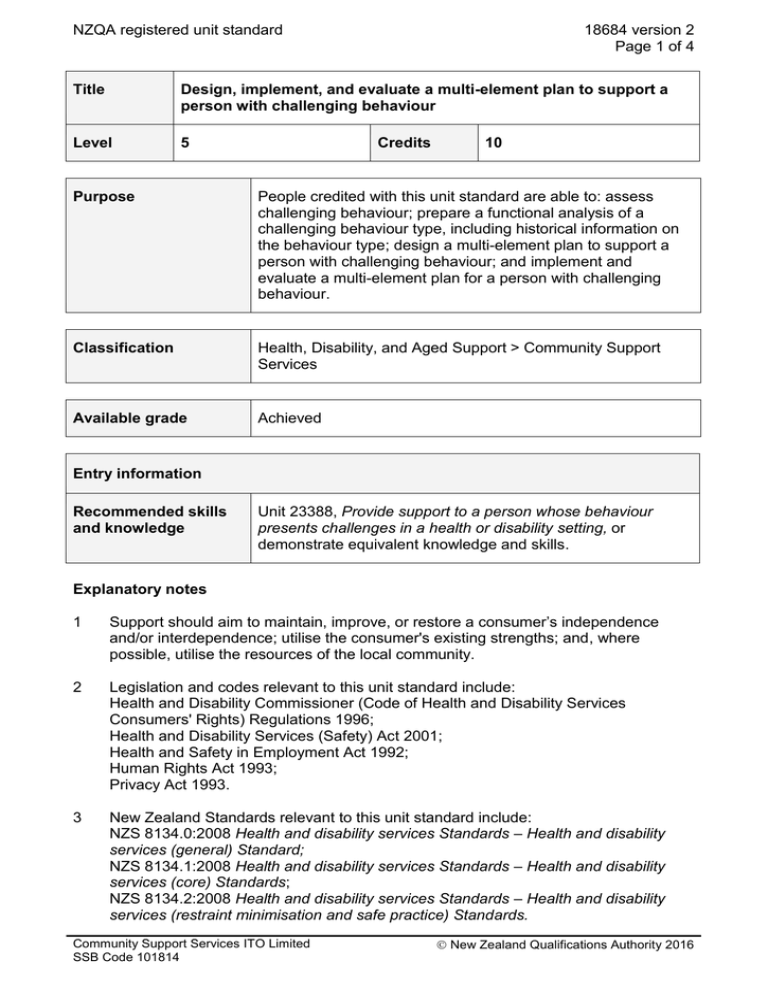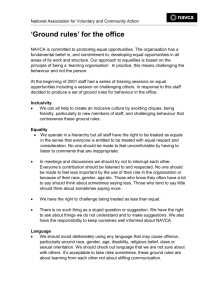NZQA registered unit standard 18684 version 2 Page 1 of 4
advertisement

NZQA registered unit standard 18684 version 2 Page 1 of 4 Title Design, implement, and evaluate a multi-element plan to support a person with challenging behaviour Level 5 Credits 10 Purpose People credited with this unit standard are able to: assess challenging behaviour; prepare a functional analysis of a challenging behaviour type, including historical information on the behaviour type; design a multi-element plan to support a person with challenging behaviour; and implement and evaluate a multi-element plan for a person with challenging behaviour. Classification Health, Disability, and Aged Support > Community Support Services Available grade Achieved Entry information Recommended skills and knowledge Unit 23388, Provide support to a person whose behaviour presents challenges in a health or disability setting, or demonstrate equivalent knowledge and skills. Explanatory notes 1 Support should aim to maintain, improve, or restore a consumer’s independence and/or interdependence; utilise the consumer's existing strengths; and, where possible, utilise the resources of the local community. 2 Legislation and codes relevant to this unit standard include: Health and Disability Commissioner (Code of Health and Disability Services Consumers' Rights) Regulations 1996; Health and Disability Services (Safety) Act 2001; Health and Safety in Employment Act 1992; Human Rights Act 1993; Privacy Act 1993. 3 New Zealand Standards relevant to this unit standard include: NZS 8134.0:2008 Health and disability services Standards – Health and disability services (general) Standard; NZS 8134.1:2008 Health and disability services Standards – Health and disability services (core) Standards; NZS 8134.2:2008 Health and disability services Standards – Health and disability services (restraint minimisation and safe practice) Standards. Community Support Services ITO Limited SSB Code 101814 New Zealand Qualifications Authority 2016 NZQA registered unit standard 18684 version 2 Page 2 of 4 4 This unit standard cannot be assessed against in a simulated environment. It is required that people seeking credit for this unit standard demonstrate competence and are assessed in the workplace: through paid or unpaid employment, or in placements in a service provider workplace negotiated by an education provider. 5 All support is in accordance with the organisation's policies and procedures. 6 Definitions Challenging behaviour type is any category of behaviour with a set of common defining traits or characteristics, including but not limited to aggressive, sexualised, self-injurious, destructive, and stereotypical behaviour. Functional analysis in the context of challenging behaviour endeavours to identify the events that contribute to and maintain the challenging behaviour. It includes five parts: a clear description of the behaviour; a history of the behaviour; antecedent analysis; consequence analysis; and a summary with an analysis of meaning. This approach is detailed in Donnellan, A. M., LaVigna, G. W., Negri-Shoultz, N., & Fassbender, L. (1988). Progress without punishment: Effective approaches for learners with behavior problems. New York: Teachers College Press. A multi-element plan in the context of challenging behaviour is a detailed and systematic programme of approaches, methodologies, strategies, and systems to support a person with challenging behaviour. A non-aversive approach to supporting a person with challenging behaviour addresses the need for behavioural change without the use of any methods that may have aversive or punitive consequences. The multi-element planning model developed by the Institute for Applied Behavior Analysis is one such method. Organisation's policies and procedures are the policies and procedures of the employing organisation of the candidate and include ethical codes, standards, and other organisational requirements. A recognised theoretical model may include but is not limited to that developed by the Crisis Prevention Institute (http://www.crisisprevention.com/), the LaVigna-Willis Model, or the Ann Donnellan Model. Information on these models can be found in the publication Progress without punishment, detailed above. Outcomes and evidence requirements Outcome 1 Assess challenging behaviour. Evidence requirements 1.1 Assessment is carried out using an assessment tool approved by the employing organisation of the candidate. 1.2 The assessment identifies and explains factors or issues contributing to the challenging behaviour. Range factors or issues may include but are not limited to – biological, medical, social, environmental, psychological, quality of life; evidence is required of a minimum of two factors or issues. Community Support Services ITO Limited SSB Code 101814 New Zealand Qualifications Authority 2016 NZQA registered unit standard 18684 version 2 Page 3 of 4 Outcome 2 Prepare a functional analysis of a challenging behaviour type, including historical information on the behaviour type. Range evidence is required of functional analysis being carried out in accordance with a recognised theoretical model. Evidence requirements 2.1 The analysis describes a specific challenging behaviour type, including historical information on the behaviour the person presents and how this behaviour has been addressed in the past. 2.2 The analysis identifies antecedent and consequential events associated with the challenging behaviour. 2.3 The analysis determines the function of the challenging behaviour for the person presenting the behaviour. Outcome 3 Design a multi-element plan to support a person with challenging behaviour. Range evidence is required of the design of a multi-element plan in accordance with a recognised theoretical model. Evidence requirements 3.1 The design of the multi-element plan is consistent with a non-aversive approach to supporting a person with challenging behaviour. 3.2 The multi-element plan identifies and analyses key motivational strategies for a person with challenging behaviour. 3.3 The multi-element plan identifies and analyses key reinforcing strategies. Outcome 4 Implement and evaluate a multi-element plan for a person with challenging behaviour. Range evidence is required of implementation and evaluation of two components of a multi-element plan in accordance with a recognised theoretical model. Evidence requirements 4.1 Implementation is in accordance with the motivational and reinforcing strategies of the multi-element plan. Range evidence is required of a minimum of one motivational and one reinforcing strategy. Community Support Services ITO Limited SSB Code 101814 New Zealand Qualifications Authority 2016 NZQA registered unit standard 4.2 18684 version 2 Page 4 of 4 Evaluation is carried out in terms of the objectives and outcomes of the multielement plan. Planned review date 31 December 2015 Status information and last date for assessment for superseded versions Process Version Date Last Date for Assessment Registration 1 17 December 2001 31 December 2011 Review 2 19 November 2010 N/A Accreditation and Moderation Action Plan (AMAP) reference 0024 This AMAP can be accessed at http://www.nzqa.govt.nz/framework/search/index.do. Please note Providers must be granted consent to assess against standards (accredited) by NZQA, or an inter-institutional body with delegated authority for quality assurance, before they can report credits from assessment against unit standards or deliver courses of study leading to that assessment. Industry Training Organisations must be granted consent to assess against standards by NZQA before they can register credits from assessment against unit standards. Providers and Industry Training Organisations, which have been granted consent and which are assessing against unit standards must engage with the moderation system that applies to those standards. Consent requirements and an outline of the moderation system that applies to this standard are outlined in the Accreditation and Moderation Action Plan (AMAP). The AMAP also includes useful information about special requirements for organisations wishing to develop education and training programmes, such as minimum qualifications for tutors and assessors, and special resource requirements. Comments on this unit standard Please contact the Community Support Services ITO Limited enquiries@careerforce.org.nz if you wish to suggest changes to the content of this unit standard. Community Support Services ITO Limited SSB Code 101814 New Zealand Qualifications Authority 2016

